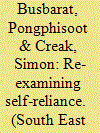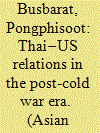| Srl | Item |
| 1 |
ID:
146702


|
|
|
|
|
| Summary/Abstract |
This article examines Thailand’s foreign policy posture towards China and the United States since the early 2000s. It argues that Thailand increasingly faces difficulties in maintaining its time-honoured diplomatic tradition of flexibility and pragmatism. The “China factor”, together with domestic developments since the late 1990s, including the rise of nationalistic sentiment among the public and political polarization, have become important determinants in the decisionmaking process vis-à-vis Thailand’s relations with Washington and Beijing. As a result, compared to other US allies in Asia, Thailand does not always accommodate American policies but, in many circumstances, acts in favour of China instead. This policy posture is not a product of a well-planned strategy, but rather a reaction to the China factor and domestic sensitivities surrounding decision-making. This current stage of Thai foreign policy can be labelled “bamboo swirling in the wind” instead of the conventional “bending with the wind” diplomacy that tends to reflect a better-calculated strategy to balance Great Power influence.
|
|
|
|
|
|
|
|
|
|
|
|
|
|
|
|
| 2 |
ID:
141740


|
|
|
|
|
| Summary/Abstract |
Self-reliance sprang to prominence in Thailand in the 1980s in response to the socioeconomic upheavals of development, globalization and rural transformation. Whereas debates over self-reliance have tended to be polemical, with scholars critiquing its idealistic, nationalist and anti-market features, this article considers the divergent meanings of self-reliance. Redirecting attention from a collective idea of the 'self' based on motifs of the self-sufficient village and nation, to individual self-making, the authors argue that self-reliance can equally refer to an entrepreneurial ethic of maximizing one's potential under conditions of rapid rural transformation through active and pragmatic engagement with the market and the state. After introducing the collective and individual faces of self-reliance, the article presents a content analysis of Theknoloyi Chaoban (Villager Technology), a magazine founded in the late 1980s to promote self-reliance among farmers. As a repository of practical handbook knowledge, the magazine encourages village self-sufficiency and national self-sourcing alongside commercial and state-based strategies for boosting productivity, thus illuminating the complex realities of rural transformation and self-making in Thailand since the 1980s.
|
|
|
|
|
|
|
|
|
|
|
|
|
|
|
|
| 3 |
ID:
155399


|
|
|
|
|
| Summary/Abstract |
This article examines the transformation of Thailand’s ties with the United States away from its “special relationship” in the Cold War, when Thailand viewed the United States as an indispensable power. The relationship in the post-Cold War period is marked by significant disagreements. Structural theories predict that China’s rise and the regional uncertainty it has created would lead Thailand to strengthen its alliance with the United States as part of a hedging strategy. In recent decades, however, the United States has failed to provide the assistance Thailand expected and its criticism of the Thai military coups of 2006 and 2014 are perceived as illegitimate interference in Thai affairs. As domestic politics plays an increasing role in Thai foreign policy, Thailand is distancing itself from the United States and moving closer to China.
|
|
|
|
|
|
|
|
|
|
|
|
|
|
|
|